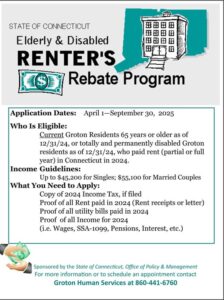Category: Featured
CLASSICAL GREECE trip presentation April 9
Wednesday, April 9 at 10 am. Register now! Let us know if you’re coming! 860-441-6623
Classical Greece March 22 — April 01, 2026
Athens, The Acropolis and Parthenon, Metéora, Delphi, Olympia, Greek Farm Visit, Cooking Class, Greek Dance
Class, Choice on Tour: Nafplio Walking Tour or Mycenae Archeological Tour. Double $3,979pp $4,229 Single if
booked before Sept 22, 2025. https://gateway.gocollette.com/link/1308280
Groton Middle School orchestra & choir concert
Wednesday, March 19 – free at 11:30 meet & greet after
My Druthers
Wed, March 19
12:30-1:30 pm
St Patrick’s Day Performance
Please join us for free dessert and a blend of traditional Irish music and sea shanties. Come on down and sing along!
Sponsored by CLUB 55
Heading to NYC for a Day Trip Tuesday, April 22
Social Breakfast Friday, March 7 – sign up now
St. Patrick’s Day Celebration!!
Tuesday March 11, 2025
11:00am—3:30pm
St. Patrick’s Day Celebration!!
Featuring:
The McLean Avenue Band & Irish Step Dancers!!
Padraig Allen and The Mclean Avenue Band have taken the Irish American music and
entertainment scene by storm with their wonderful arrangements of pop, rock, and folk
songs, intertwined with traditional Irish toons and upbeat melodies!
$55.00 pp
Corned Beef & Cabbage/ Baked Cod
Do I need a Living Will?
A living will is a legal document that outlines your wishes regarding medical treatment and end-of-life care in case you become unable to communicate them yourself, typically due to illness or incapacity. It’s a way to make sure that your healthcare preferences are followed when you’re not able to express them.
Here are some things to consider:
Reasons to Have a Living Will:
- Medical Treatment Decisions:
- A living will allows you to specify what kind of medical treatments you do or do not want if you become seriously ill, incapacitated, or unable to make decisions for yourself. For example, you can outline your wishes for life support, organ donation, or resuscitation.
- Relieves Burden on Family:
- A living will can provide clarity and relieve your loved ones from the emotional burden of making difficult healthcare decisions on your behalf.
- Ensure Your Wishes Are Followed:
- If you have specific preferences about life-saving treatments or end-of-life care, a living will ensures that those wishes are legally documented, minimizing the risk of them being overlooked or misunderstood.
- Prevents Unnecessary Medical Interventions:
- If you are in a situation where you don’t want aggressive treatments or life-sustaining measures (like a ventilator or feeding tube) to be used, a living will allows you to make your wishes clear.
- Peace of Mind:
- Having a living will in place can give you peace of mind knowing that your healthcare decisions are already outlined and legally binding in the event that you can’t communicate your desires.
Related Documents to Consider:
Healthcare Proxy or Durable Power of Attorney for Healthcare: This is a legal document that allows you to designate someone to make healthcare decisions on your behalf if you’re unable to do so.
Do Not Resuscitate (DNR) Order: This document specifies whether or not you want to receive CPR in the event of a cardiac arrest. It can be part of a living will or a separate document.
Bottom Line:
A living will is a good idea if you want to ensure that your healthcare preferences are clear and followed. It can provide peace of mind to both you and your loved ones, especially if you have strong feelings about your medical treatment in the event of serious illness or injury.
I lost my wallet!!!
Losing your wallet is extremely stressful, but taking quick action can help minimize the risk of identity theft and financial loss. Here’s a step-by-step guide on what to do if you lose your wallet:
- Stay Calm and Retrace Your Steps
- Search your surroundings: Double-check all the places you’ve been recently, such as your car, home, or office, to make sure it’s not just misplaced.
- Ask around: If you were at a store, restaurant, or public place, ask staff or employees if anyone has turned in a lost wallet.
- Report the Loss to the Authorities
- Contact local authorities: If you believe your wallet was stolen, report it to the police. They may be able to help with any follow-up or investigations, especially if your ID or credit cards are used fraudulently.
- File a police report: While it might not immediately help you recover the wallet, it can be important for any future fraud claims.
- Contact Your Bank and Credit Card Companies
- Freeze or cancel your cards: Call your bank and any credit card companies to report the loss and cancel or freeze your accounts to prevent unauthorized transactions.
- Request replacements: Ask for new cards and any other necessary documents (like checks) to be issued.
- Review recent transactions: Look at your recent transactions to ensure no fraudulent charges were made.
- Notify the DMV (If Your ID Was in the Wallet)
- If your driver’s license or state ID was in the wallet, contact your Department of Motor Vehicles (DMV) to report the loss and request a replacement.
- Contact Other Issuers
- Health Insurance: If you had your health insurance card in your wallet, contact your insurer to report the loss and get a replacement card.
- Membership Cards: Report lost membership cards (e.g., library, gym, or frequent shopper cards) to their respective organizations and request replacements.
- Monitor Your Accounts
- Monitor your bank accounts: Keep a close eye on your financial accounts for any unauthorized transactions.
- Credit report: Consider requesting a credit report to check for any suspicious activity or signs of identity theft. You can get a free report once a year from each of the three major credit bureaus (Equifax, Experian, and TransUnion) at AnnualCreditReport.com.
- Set up fraud alerts: If you’re concerned about identity theft, you can place a fraud alert on your credit file to notify creditors that they should verify your identity before opening new accounts in your name.
- Replace Your ID and Other Important Documents
- Driver’s license or state ID: Visit the DMV (or equivalent agency in your area) to request a replacement.
- Social Security card: If your Social Security card was in the wallet, contact the Social Security Administration to request a replacement. Be cautious about having your Social Security number exposed.
- Other important IDs: If you had other forms of ID or documents (like your passport), contact the relevant authorities to replace them.
- Consider Using a Wallet Tracker in the Future
- Wallet tracking devices: For future peace of mind, you might want to consider a Bluetooth-enabled tracker, like Tile or Apple AirTag, that can help you locate your wallet if it gets lost again.
- Check Your Insurance Coverage
- Loss and theft coverage: Some homeowners or renters insurance policies cover the loss of personal items, including wallets. Check with your insurance provider to see if you can file a claim.
- Stay Vigilant Against Identity Theft
- Consider a credit freeze: If you’re concerned about the risk of identity theft, consider placing a freeze on your credit with the major credit bureaus. This will prevent anyone from opening new accounts in your name without your permission.
- Identity theft monitoring services: Some people choose to enroll in identity theft protection services that monitor their personal information and alert them to suspicious activity.
Conclusion:
Losing your wallet can be an inconvenience, but quick action can reduce the risk of financial or identity theft. By contacting the necessary institutions, monitoring your accounts, and taking steps to replace lost documents, you can protect yourself and move forward from the situation.
Who goes to the Senior Center?
- Older Adults (Seniors):
- Senior centers are primarily used by older adults who are looking for a place to engage socially, stay active, and access resources. Many of these individuals may be retired or have free time during the day and are looking for opportunities to socialize, learn new things, or maintain a healthy lifestyle.
- People Seeking Social Connection:
- Seniors who are experiencing loneliness or isolation can benefit from the social environment of a senior center. These centers provide a space for older adults to meet new people, form friendships, and engage in group activities that reduce feelings of isolation.
- Active Seniors:
- Many seniors who are still physically and mentally active use senior centers to engage in fitness programs, hobby groups, educational classes, and other stimulating activities that help maintain their health and well-being.
- Seniors with Specific Health or Social Needs:
- Some senior centers offer specialized programs for seniors with chronic health conditions (e.g., arthritis, diabetes) or disabilities. They may also provide access to resources like counseling, support groups, or assistance with navigating healthcare services.
- Caregivers:
- Senior centers can be a valuable resource for caregivers of older adults, offering support groups, respite care, and educational programs to help them manage the responsibilities of caregiving.
- Low-Income Seniors:
- Some senior centers offer services and programs tailored to low-income seniors, such as meals, transportation assistance, and financial counseling. These centers can be an important lifeline for those who may not have access to other resources.
- Seniors Interested in Lifelong Learning:
- Many senior centers offer educational classes on a variety of topics, including arts and crafts, computer skills, history, languages, and more. These classes are often designed to help seniors continue learning and exploring new interests.
- Seniors Looking for Volunteer Opportunities:
- Senior centers often encourage older adults to volunteer in the community, whether it’s helping with events, leading a class, or contributing to local charities. Volunteering can provide seniors with a sense of purpose and fulfillment.
- Seniors Seeking Transportation Assistance:
- For seniors who may no longer be able to drive, some senior centers offer transportation services to and from the center, as well as to medical appointments, grocery stores, or other essential destinations.






